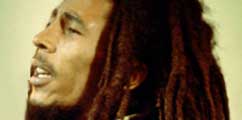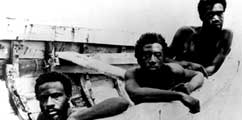- Roots reggae truly put Jamaican music on the map as a bona fide protest movement.
- Rastas were so despised within polite Jamaican society that at one point the police were under orders to shoot them first and question them after.
- The most famous Jamaican in the country’s history is Bob Marley, Rastaman and figurehead of the roots movement.
- Roots music is big. It’s loved by all types of people across the globe.
 |
 | |
| Bob Marley |
Burning
Spear |
| Ten years on from
Independence, and Jamaica’s people began to notice they were
worse instead of better off. The island was gripped by
unemployment, crime and violence, and as so many of the
emerging generation of Jamaicans, who had grown up with
Independence, were victims of this, they reacted with the most
potent weapon at their disposal – music. As the 1970s
unfolded, subject matter changed to give voice to the protests
the people wanted to express against the government, while
urging their fellow youth to stick to the path of
righteousness. Large numbers embraced Rastafari as being not only a manifestation of what they wanted from the government – a forcefully honest doctrine of peace, love and anti-corruption – but presenting an alternative way of living within the grinding poverty that had become commonplace. They espoused the teaching of Marcus Garvey (self-help and repatriation) to provide hope. As many musicians locksed up, Rasta’s influence over the sounds became obvious: much of reggae’s inherent sunniness seemed to cloud over: the bass got deeper and more pronounced; the tempo slowed down portentously; and lyrics frequently spat fire and brimstone. It was dread. It was also the period that saw reggae being taken seriously by rock fans around the world as a music that had something to say - punks in Britian adopted roots reggae as a big part of their soundtrack, identifying closely with its sense of alienation. During the roots era, artists like Burning Spear, Culture, The Congoes, Big Youth, The Mighty Diamonds, Dillinger, Tapper Zukie, Lee Perry, The Ethiopians and Max Romeo became cult heroes, while the roots movement’s figurehead Bob Marley became the most famous Jamaican ever. |
|
Next chapter: Lovers
Rock |